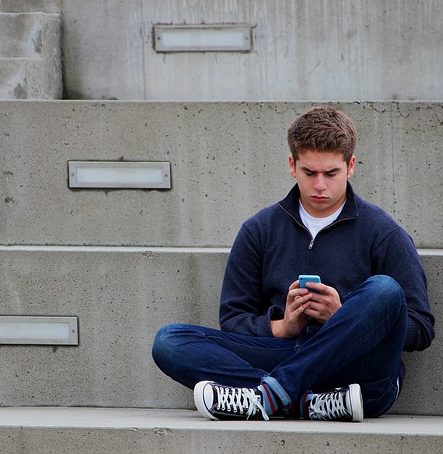 Researchers found that teens who spent a lot of time in front of screen devices — playing computer games, using more social media, texting and video chatting — were less happy than those who invested time in non-screen activities like sports, reading newspapers and magazines, and face-to-face social interaction. The happiest teens used digital media for less than an hour per day. But after a daily hour of screen time, unhappiness rises steadily along with increasing screen time.
Researchers found that teens who spent a lot of time in front of screen devices — playing computer games, using more social media, texting and video chatting — were less happy than those who invested time in non-screen activities like sports, reading newspapers and magazines, and face-to-face social interaction. The happiest teens used digital media for less than an hour per day. But after a daily hour of screen time, unhappiness rises steadily along with increasing screen time.
Teens whose eyes are habitually glued to their smartphones are markedly unhappier, said study lead author and San Diego State University and professor of psychology Jean M. Twenge.
To investigate this link, Twenge, along with colleagues Gabrielle Martin at SDSU and W. Keith Campbell at the University of Georgia, crunched data from the Monitoring the Future (MtF) longitudinal study, a nationally representative survey of more than a million U.S. 8th-, 10th-, and 12th-graders. The survey asked students questions about how often they spent time on their phones, tablets and computers, as well as questions about their in-the-flesh social interactions and their overall happiness.
On average, they found that teens who spent more time in front of screen devices — playing computer games, using social media, texting and video chatting — were less happy than those who invested more time in non-screen activities like sports, reading newspapers and magazines, and face-to-face social interaction.
Twenge believes this screen time is driving unhappiness rather than the other way around.
Total screen abstinence doesn’t lead to happiness either, Twenge found. The happiest teens used digital media a little less than an hour per day. But after a daily hour of screen time, unhappiness rises steadily along with increasing screen time.
Read the full article in Science Daily. Also see “Teens who spend less time in front of screens are happier — up to a point, new research shows” in the Washington Post.
Jean M. Twenge, Gabrielle N. Martin, W. Keith Campbell. Decreases in Psychological Well-Being Among American Adolescents After 2012 and Links to Screen Time During the Rise of Smartphone Technology. Emotion, 2018; DOI: 10.1037/emo0000403
To schedule an evaluation or to get advice about your child’s challenges, call or email a CHC Care Coordinator at 650.688.3625 or careteam@stage.chconline.org
This resource is filed under:





